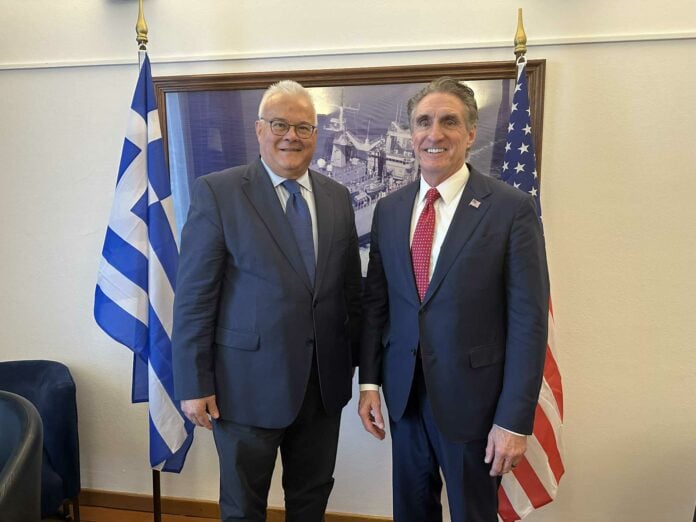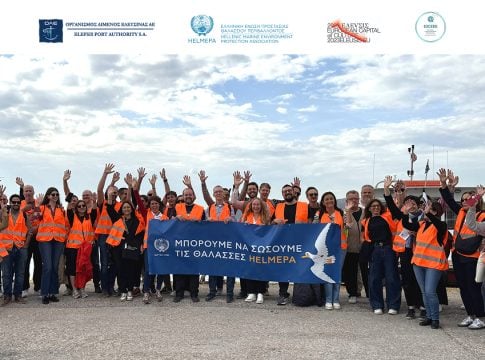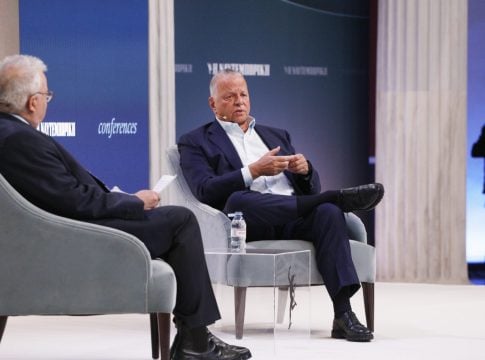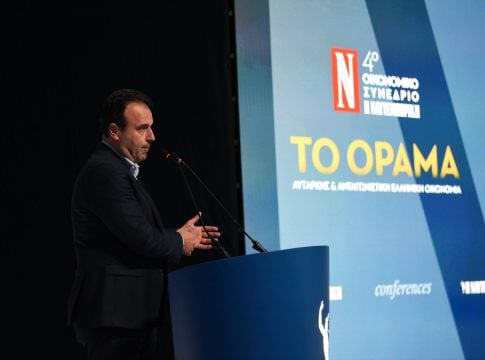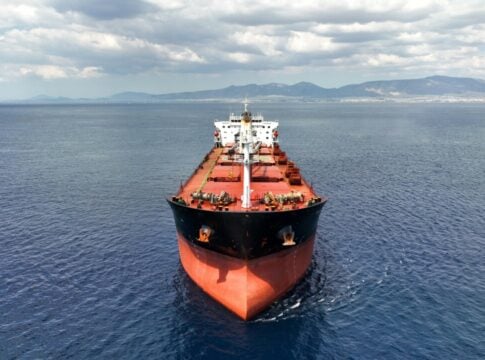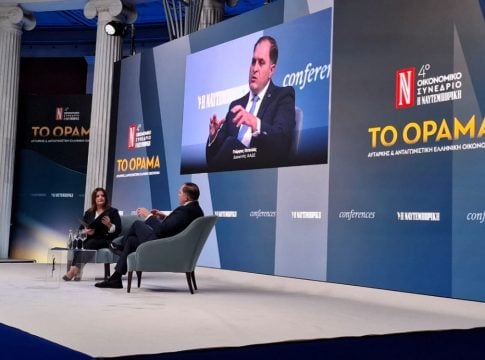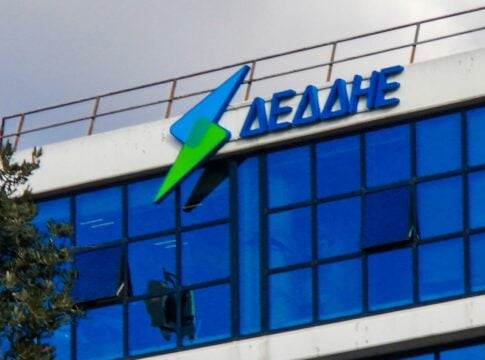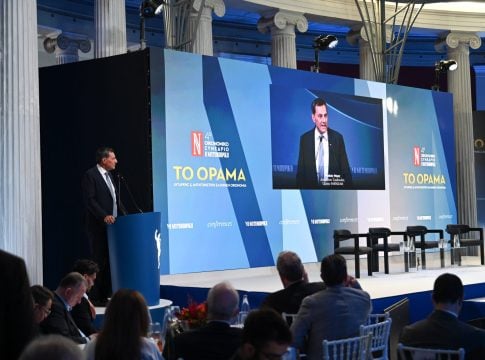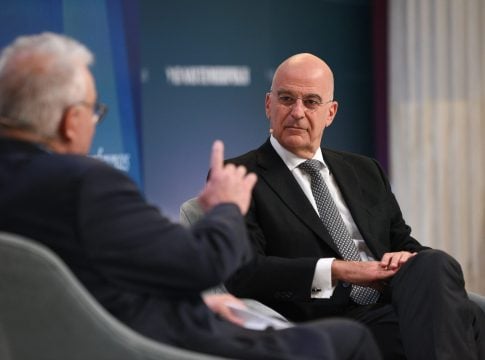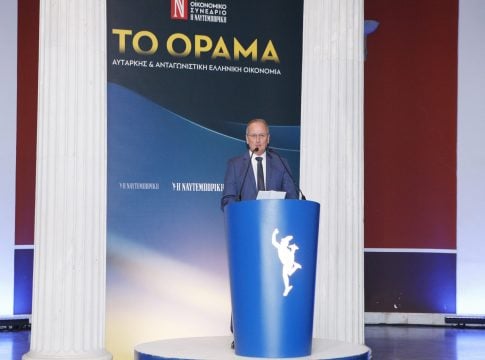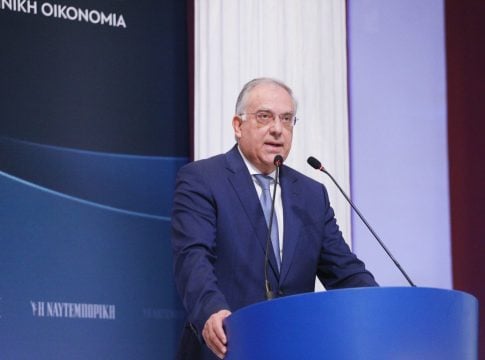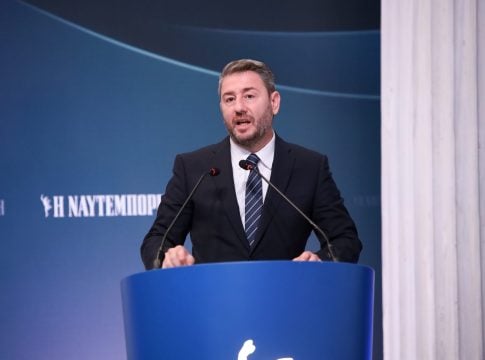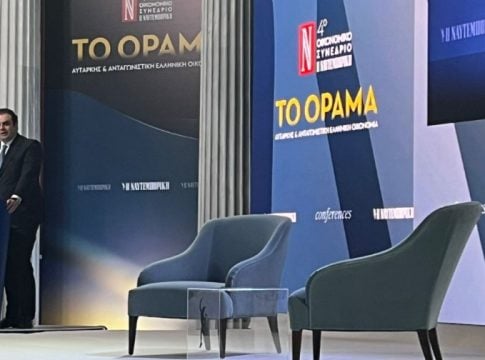The US has big plans for US-Greece cooperation in the energy and shipbuilding sectors, as emphasized by US Secretary of the Interior, Doug Burgum, in an exclusive interview with “N”.
Burgum spoke of a “great collaboration” between Chevron and Hellenic Energy, which will further contribute to strengthening Greece’s role as an energy hub for Southeastern Europe.
The full interview of the US Secretary of the Interior, Doug Burgum, to “N” and Michalis Psilos follows:
First of all, I would like to ask you about your official and very, very important visit to Greece. Tell us about the purpose of your visit.
“First of all, this is a signal of the importance of the relationship between the United States and Greece.
There has always been a deep affection between the two countries. There has been great collaboration on defense. There are shared values between the government of Prime Minister Mitsotakis and President Trump. There is also a synergy around policies of regulatory reform and pro-business, pro-energy policies, lower taxes and lower interest rates, with the aim of a strong economy. And, for Greece, this is definitely showing up in the numbers: strong interest in foreign capital investments coming to Greece, even from American technology companies.”
“First of all, this is a signal of the importance of the relationship between the United States and Greece.
There has always been a deep affection between the two countries. There has been great collaboration on defense. There are shared values between the government of Prime Minister Mitsotakis and President Trump. There is also a synergy around policies of regulatory reform and pro-business, pro-energy policies, lower taxes and lower interest rates, with the aim of a strong economy. And, for Greece, this is definitely showing up in the numbers: strong interest in foreign capital investments coming to Greece, even from American technology companies.”
You are the Secretary of the Interior in the Trump administration, but you also have energy in your portfolio…
“Although Secretary of the Interior, the title is misnamed. My portfolio includes all the Pacific Islands, the management of almost 20% of the territory of the United States, and all offshore drilling. Whether it is minerals, critical raw materials, rare earths, energy development, even forestry. So, it concerns all natural resources. And having a strong energy policy is what leads to a strong economy and low inflation.
I am the head of the ‘National Energy Dominance Council’. And probably the best translation for Greek would be the National Energy Abundance Council because the idea was to go beyond energy independence on a net basis, but to actually have enough energy to sell to our friends and allies.
Helping the EU and Europe achieve its goals of completely ending the use of Russian natural gas is one of the strategic goals of the Trump administration. President Trump wants peace in the world. He really doesn’t like it when people die in war. As he says, ‘I want to stop the killing.’
And the American president stopped a series of conflicts in the first seven months of his term. But when we look at countries like Iran, which is funding terrorism, or Russia, which is funding a war, it doesn’t make sense for our allies to buy energy from these countries. Because they use this energy, the oil and gas sales, to finance the wars they are waging. So, in a way, we have to stop funding two sides of a conflict. President Trump sees energy policy as a path to peace. He sees energy diplomacy as a path to prosperity, to low inflation and high growth.
Humanity is at a turning point in its history, as artificial intelligence will be a major consumer of electricity. But, for the first time in human history, a kilowatt of electricity can be converted directly into artificial intelligence. This has never happened before.”
“Although Secretary of the Interior, the title is misnamed. My portfolio includes all the Pacific Islands, the management of almost 20% of the territory of the United States, and all offshore drilling. Whether it is minerals, critical raw materials, rare earths, energy development, even forestry. So, it concerns all natural resources. And having a strong energy policy is what leads to a strong economy and low inflation.
I am the head of the ‘National Energy Dominance Council’. And probably the best translation for Greek would be the National Energy Abundance Council because the idea was to go beyond energy independence on a net basis, but to actually have enough energy to sell to our friends and allies.
Helping the EU and Europe achieve its goals of completely ending the use of Russian natural gas is one of the strategic goals of the Trump administration. President Trump wants peace in the world. He really doesn’t like it when people die in war. As he says, ‘I want to stop the killing.’
And the American president stopped a series of conflicts in the first seven months of his term. But when we look at countries like Iran, which is funding terrorism, or Russia, which is funding a war, it doesn’t make sense for our allies to buy energy from these countries. Because they use this energy, the oil and gas sales, to finance the wars they are waging. So, in a way, we have to stop funding two sides of a conflict. President Trump sees energy policy as a path to peace. He sees energy diplomacy as a path to prosperity, to low inflation and high growth.
Humanity is at a turning point in its history, as artificial intelligence will be a major consumer of electricity. But, for the first time in human history, a kilowatt of electricity can be converted directly into artificial intelligence. This has never happened before.”
Mr. Minister, as Plato said, “knowledge creates happiness”…
“Exactly. Knowledge is power. This is a saying that exists in many languages. But now literally power becomes knowledge. Power is knowledge. If you have more electricity, you can generate more intelligence. Exactly. And a data center is an artificial intelligence. An artificial intelligence factory, better, an artificial intelligence factory, where you take electricity and turn it into artificial intelligence, is a general-purpose technology, which can be used by every sector: Defense, shipbuilding, agriculture, education, governance. Your Prime Minister showed me this, during our meeting. I felt that the Greeks were heading in the right direction, under the leadership of Prime Minister Mitsotakis, because he is trying to take productivity tools and deliver better government for the people, using the available technological tools.”
“Exactly. Knowledge is power. This is a saying that exists in many languages. But now literally power becomes knowledge. Power is knowledge. If you have more electricity, you can generate more intelligence. Exactly. And a data center is an artificial intelligence. An artificial intelligence factory, better, an artificial intelligence factory, where you take electricity and turn it into artificial intelligence, is a general-purpose technology, which can be used by every sector: Defense, shipbuilding, agriculture, education, governance. Your Prime Minister showed me this, during our meeting. I felt that the Greeks were heading in the right direction, under the leadership of Prime Minister Mitsotakis, because he is trying to take productivity tools and deliver better government for the people, using the available technological tools.”
Already, Microsoft is building an AI factory in Greece…
“Exactly. And I’m sure that’s one of the reasons Microsoft announced that it’s building an AI factory here in Greece. The next wave of capital investment in any economy is going to be driven by who has low electricity prices.
You wouldn’t put a flour mill in a location where wheat costs three times more than it would somewhere else, where you could get high-quality wheat at a low price.
An AI factory ‘goes’ to places with reliable, abundant, affordable, and secure electricity. That’s how decisions are made. And those capital flows are going to be huge.
The capital flows into AI data centers are currently, in the United States, larger than many other industries combined.
They are bigger than manufacturing. They are bigger than the auto industry.
Countries that understand this and have energy policies that prioritize security, abundance and affordability will see capital investment. Countries that prioritize decarbonization, that have high cost and unreliable energy, will see zero investment.”
“Exactly. And I’m sure that’s one of the reasons Microsoft announced that it’s building an AI factory here in Greece. The next wave of capital investment in any economy is going to be driven by who has low electricity prices.
You wouldn’t put a flour mill in a location where wheat costs three times more than it would somewhere else, where you could get high-quality wheat at a low price.
An AI factory ‘goes’ to places with reliable, abundant, affordable, and secure electricity. That’s how decisions are made. And those capital flows are going to be huge.
The capital flows into AI data centers are currently, in the United States, larger than many other industries combined.
They are bigger than manufacturing. They are bigger than the auto industry.
Countries that understand this and have energy policies that prioritize security, abundance and affordability will see capital investment. Countries that prioritize decarbonization, that have high cost and unreliable energy, will see zero investment.”
Your visit also coincided with the submission of a bid by the US energy giant Chevron and Greece Hellenic Energy for the exploration of offshore “plots” south of Crete and the Peloponnese. A great project for Greece and the United States…
“Absolutely. This is a fantastic collaboration between Chevron and Hellenic Energy. And it was very exciting to be with the Greek Minister of Energy on the day the bids were opened. And it sounds very positive that this collaboration will be able to move forward towards development. And that is very positive, very positive for the energy abundance of Greece and its citizens.”
“Absolutely. This is a fantastic collaboration between Chevron and Hellenic Energy. And it was very exciting to be with the Greek Minister of Energy on the day the bids were opened. And it sounds very positive that this collaboration will be able to move forward towards development. And that is very positive, very positive for the energy abundance of Greece and its citizens.”
As you know, there are many disputes, confrontations and challenges to our sovereign rights in the Mediterranean Sea. Is the US government ready to support American companies? If necessary, of course?
“We have stayed out of the negotiation. It is not our job. But when we have to get involved in these discussions, we do. And there are some parallels, where we have supported Chevron in protecting its activities in offshore areas related to disputes with Venezuela and its neighbor Guyana, which is one of the fastest growing new oil economies in the world, on the northern side of South America. Venezuela is threatening a dispute over Guyana and Venezuela waters. And I will just mention the news reports that there were F-35s that did a flyover over last Sunday, during the inauguration of the newly elected President Irfaan Ali of Guyana, as a sign of cooperation with the United States.”
“We have stayed out of the negotiation. It is not our job. But when we have to get involved in these discussions, we do. And there are some parallels, where we have supported Chevron in protecting its activities in offshore areas related to disputes with Venezuela and its neighbor Guyana, which is one of the fastest growing new oil economies in the world, on the northern side of South America. Venezuela is threatening a dispute over Guyana and Venezuela waters. And I will just mention the news reports that there were F-35s that did a flyover over last Sunday, during the inauguration of the newly elected President Irfaan Ali of Guyana, as a sign of cooperation with the United States.”
“Signal” for Revithoussa Infrastructure Expansion
How do you see Greece’s role, its geopolitical power, in the Eastern Mediterranean?
“Greece is in a great spot. I mean, from a historical and geographical point of view, this puts Greece in a fantastic position. Combine that with the leadership of the Prime Minister and his policy of reducing taxes and various reforms, which are leading to attracting investment and interest from the United States.
In the summer, the natural gas that was unloaded at Revithoussa reached Ukraine. If you want to help all of Europe stay away from Russian natural gas, you must have the infrastructure and that infrastructure is already here, but with investment it can be expanded much further. It is an opportunity for Greece to become a very important energy hub for Southeastern Europe.
For example, there is a lot of heat underground in Greece. Geothermal could be a very good long-term prospect. So we see partnerships for 2028, 2030 and beyond, in all these technologies.
In the US, we are also ordering coal plants to stay open, instead of closing. It is crazy to think that we are going to save the planet by shutting down baseload power generation.
In the short term, the race with China in terms of electricity generation continues. Last year, China added 93GW of coal-fired electricity. They are using more coal than the Western world is stopping producing. We need that baseload to help win the AI race as well. We can solve every climate problem before the year 2100.
But we cannot let the costs of energy poverty rise, security decline, and dependence on adversaries. Energy abundance is the path to solving these problems.”
“Greece is in a great spot. I mean, from a historical and geographical point of view, this puts Greece in a fantastic position. Combine that with the leadership of the Prime Minister and his policy of reducing taxes and various reforms, which are leading to attracting investment and interest from the United States.
In the summer, the natural gas that was unloaded at Revithoussa reached Ukraine. If you want to help all of Europe stay away from Russian natural gas, you must have the infrastructure and that infrastructure is already here, but with investment it can be expanded much further. It is an opportunity for Greece to become a very important energy hub for Southeastern Europe.
For example, there is a lot of heat underground in Greece. Geothermal could be a very good long-term prospect. So we see partnerships for 2028, 2030 and beyond, in all these technologies.
In the US, we are also ordering coal plants to stay open, instead of closing. It is crazy to think that we are going to save the planet by shutting down baseload power generation.
In the short term, the race with China in terms of electricity generation continues. Last year, China added 93GW of coal-fired electricity. They are using more coal than the Western world is stopping producing. We need that baseload to help win the AI race as well. We can solve every climate problem before the year 2100.
But we cannot let the costs of energy poverty rise, security decline, and dependence on adversaries. Energy abundance is the path to solving these problems.”
The Trump administration is seeking to end all European dependence on Russian gas. What is the role of the LNG terminal in Alexandroupolis and, subsequently, the so-called ‘Vertical Corridor’ connecting Greece’s networks with the Balkans and Ukraine?
“Alexandroupolis and the ‘Vertical Corridor’ are of very great strategic importance. I am referring to the unloading of LNG and the transportation of gas to the North. At the Revithoussa facilities, which we also visited, 35 ships have transported LNG this year – 31 of them from the United States. We see the market share of this cooperation increasing between us, American natural gas coming here.”
“Alexandroupolis and the ‘Vertical Corridor’ are of very great strategic importance. I am referring to the unloading of LNG and the transportation of gas to the North. At the Revithoussa facilities, which we also visited, 35 ships have transported LNG this year – 31 of them from the United States. We see the market share of this cooperation increasing between us, American natural gas coming here.”
How is the cooperation between the two countries in shipping and shipbuilding progressing?
“Greece dominates global shipping, with 20% to 25% of the world’s fleet flying the Greek flag. The US was number one in shipping and shipbuilding after World War II. Now we are not even in the top 15 in shipbuilding. President Trump said we will come back.
Speaking with the Greek Ministers of Development and Shipping at the Elefsis shipyards, we saw that there is a great opportunity for excellent collaborations. There is nothing concrete to announce today, but obviously we have made it a priority to highlight shipping and shipbuilding at the top of the agenda of this visit.
Do you see these ONEX facilities here in Elefsis? This is an investment where the American Development Finance Corporation (DFC) spent 125 million dollars on this facility. With these funds, the Elefsis Shipyards has been significantly strengthened, servicing over 200 ships. ONEX can now repair ships of all sizes. We are already looking at additional capital investments here for floating tanks, for some of the largest container ships and the largest LNG carriers. I mean, these facilities are the ‘key’.
There is no energy security today, without control of shipping. And there is no control of shipping, if there is no ability to repair and maintain the fleet, to keep it in operation. So it is all connected.
I think there will be some very interesting discussions, in the coming weeks and months, about possible additional partnerships and investment opportunities that will go both ways between our two countries on shipping.”
“Greece dominates global shipping, with 20% to 25% of the world’s fleet flying the Greek flag. The US was number one in shipping and shipbuilding after World War II. Now we are not even in the top 15 in shipbuilding. President Trump said we will come back.
Speaking with the Greek Ministers of Development and Shipping at the Elefsis shipyards, we saw that there is a great opportunity for excellent collaborations. There is nothing concrete to announce today, but obviously we have made it a priority to highlight shipping and shipbuilding at the top of the agenda of this visit.
Do you see these ONEX facilities here in Elefsis? This is an investment where the American Development Finance Corporation (DFC) spent 125 million dollars on this facility. With these funds, the Elefsis Shipyards has been significantly strengthened, servicing over 200 ships. ONEX can now repair ships of all sizes. We are already looking at additional capital investments here for floating tanks, for some of the largest container ships and the largest LNG carriers. I mean, these facilities are the ‘key’.
There is no energy security today, without control of shipping. And there is no control of shipping, if there is no ability to repair and maintain the fleet, to keep it in operation. So it is all connected.
I think there will be some very interesting discussions, in the coming weeks and months, about possible additional partnerships and investment opportunities that will go both ways between our two countries on shipping.”
One last question, Mr. Minister: Is there any possibility of US assistance in the electrical interconnection between Greece, Cyprus, Israel or Egypt?
“The three plus one framework that you referenced is a very important strategy. In addition to the electrical interconnection, there are discussions today with some of the private sector companies, regarding fiber optic connections, including all of these countries, as well as Egypt and others.
In some cases, we want to convert electricity into knowledge and transfer knowledge – when we do that, I think we will see a lot of activity. And I saw it at the Elefsis Shipyards. They are repairing ships that specialize in laying cables. I think the shipyards could have a lot of work, whether it is electrical cables or fiber optic cables.”
“The three plus one framework that you referenced is a very important strategy. In addition to the electrical interconnection, there are discussions today with some of the private sector companies, regarding fiber optic connections, including all of these countries, as well as Egypt and others.
In some cases, we want to convert electricity into knowledge and transfer knowledge – when we do that, I think we will see a lot of activity. And I saw it at the Elefsis Shipyards. They are repairing ships that specialize in laying cables. I think the shipyards could have a lot of work, whether it is electrical cables or fiber optic cables.”


